
Julia Agrippina, also referred to as Agrippina the Younger, was Roman empress from 49 to 54 AD, the fourth wife and niece of Emperor Claudius, and the mother of Nero.
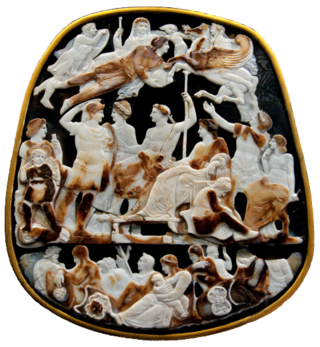
The Julio-Claudian dynasty comprised the first five Roman emperors: Augustus, Tiberius, Caligula, Claudius, and Nero.
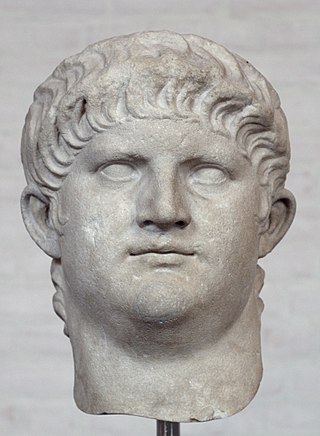
Nero Claudius Caesar Augustus Germanicus was Roman emperor and the final emperor of the Julio-Claudian dynasty, reigning from AD 54 until his death in AD 68.
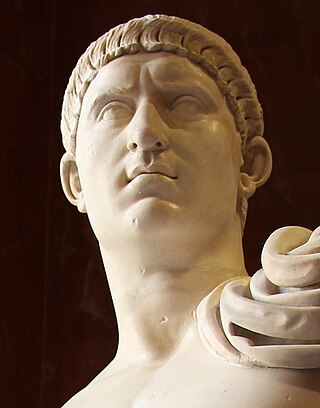
Otho was Roman emperor, ruling for three months from 15 January to 16 April 69. He was the second emperor of the Year of the Four Emperors.
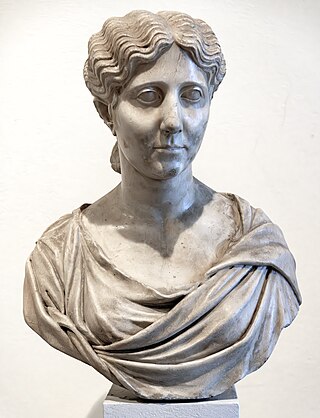
Antonia Minor was the younger of two surviving daughters of Mark Antony and Octavia Minor. She was a niece of the Emperor Augustus, sister-in-law of the Emperor Tiberius, paternal grandmother of the Emperor Caligula and Empress Agrippina the Younger, mother of the Emperor Claudius, and maternal great-grandmother of the Emperor Nero. She outlived her husband Drusus, her oldest son, her daughter, and several of her grandchildren.
Ofonius Tigellinus was a prefect of the Roman imperial bodyguard, known as the Praetorian Guard, from 62 until 68, during the reign of emperor Nero. Tigellinus gained imperial favour through his acquaintance with Nero's mother Agrippina the Younger, and was appointed prefect upon the death of his predecessor Sextus Afranius Burrus, a position Tigellinus held first with Faenius Rufus and then Nymphidius Sabinus.

Aelia Paetina or Paetina was the second wife of the Roman Emperor Claudius. Her biological father was a consul of 4 AD, Sextus Aelius Catus, while her mother is unknown.

Poppaea Sabina, also known as Ollia, was a Roman empress as the second wife of the Emperor Nero. She had also been wife to the future emperor Otho. The historians of antiquity describe her as a beautiful woman who used intrigues to become empress.
Claudia Acte was a freedwoman of ancient Rome who became a mistress of the emperor Nero. She came from Asia Minor and might have become a slave of the Emperor Claudius, following his expansion of the Roman Empire into Lycia and Pamphylia; or she might have been purchased later, by Octavia, Claudius' daughter.

Claudia Livia was the only daughter of Nero Claudius Drusus and Antonia Minor and sister to Roman Emperor Claudius and general Germanicus, and thus paternal aunt of emperor Caligula and maternal great-aunt of emperor Nero, as well as the niece and daughter-in-law of Tiberius. She was named after her grandmother, Augustus' wife Livia Drusilla, and commonly known by her family nickname Livilla. She was born after Germanicus and before Claudius.

Julia Drusilla was a member of the Roman imperial family, the second daughter and fifth child of Germanicus and Agrippina the Elder to survive infancy. She was the favorite sister of Emperor Caligula, who, after her death, had her deified under the name Diva Drusilla Panthea, and named his daughter Julia Drusilla after her.

Julia Livia, was the daughter of Drusus Julius Caesar and Livilla, and granddaughter of the Roman Emperor Tiberius. She was also a first cousin of the emperor Caligula, and niece of the emperor Claudius.

Nero Julius Caesar was the adopted grandson and heir of the Roman Emperor Tiberius, alongside his brother Drusus. Born into the prominent Julio-Claudian dynasty, Nero was the son of Tiberius' general and heir, Germanicus. After the deaths of his father and of Tiberius' son, Drusus the Younger, Nero and his brother Drusus were adopted together by Tiberius in September AD 23. As a result of being heirs of the emperor, he and his brother enjoyed accelerated political careers.

Claudia Antonia was the daughter and oldest surviving child of the Roman Emperor Claudius and the only child of his second wife Aelia Paetina. Antonia was a great great-niece of the Emperor Augustus, great-niece of the Emperor Tiberius, first cousin of the Emperor Caligula, half-sister to Claudia Octavia and Britannicus, and cousin, stepsister and sister-in-law of the Emperor Nero.

Julia Livilla was the youngest child of Germanicus and Agrippina the Elder and the youngest sister of the Emperor Caligula.

Claudia Octavia was a Roman empress. She was the daughter of the Emperor Claudius and Valeria Messalina. After her mother's death and father's remarriage to her cousin Agrippina the Younger, she became the stepsister of the future Emperor Nero. She also became his wife, in a marriage between the two which was arranged by Agrippina.

Octavia the Younger was the elder sister of the first Roman Emperor, Augustus, the half-sister of Octavia the Elder, and the fourth wife of Mark Antony. She was also the great-grandmother of the Emperor Caligula and Empress Agrippina the Younger, maternal grandmother of the Emperor Claudius, and paternal great-grandmother and maternal great-great-grandmother of the Emperor Nero.
A.D. (1985) is an American/Italian miniseries in six parts which adapts the narrative in the Acts of the Apostles. Considered as the third and final installment in a TV miniseries trilogy which began with Moses the Lawgiver (1974) and Franco Zeffirelli's Jesus of Nazareth (1977), it was adapted from Anthony Burgess's 1985 novel The Kingdom of the Wicked, which was itself a sequel to Burgess's book Man of Nazareth, on which was based Zeffirelli's movie. The title is the abbreviation for Anno Domini, as the events occur in the first years of the Christian Era.
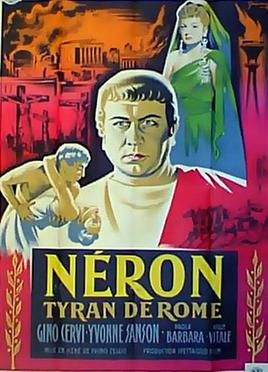
Nero and the Burning of Rome is a 1953 Italian epic historical drama film directed by Primo Zeglio and loosely based on real life events of Roman emperor Nero. It was based on the novel Nerone e Messalina (c.1949) by Harry Bluhmen.















